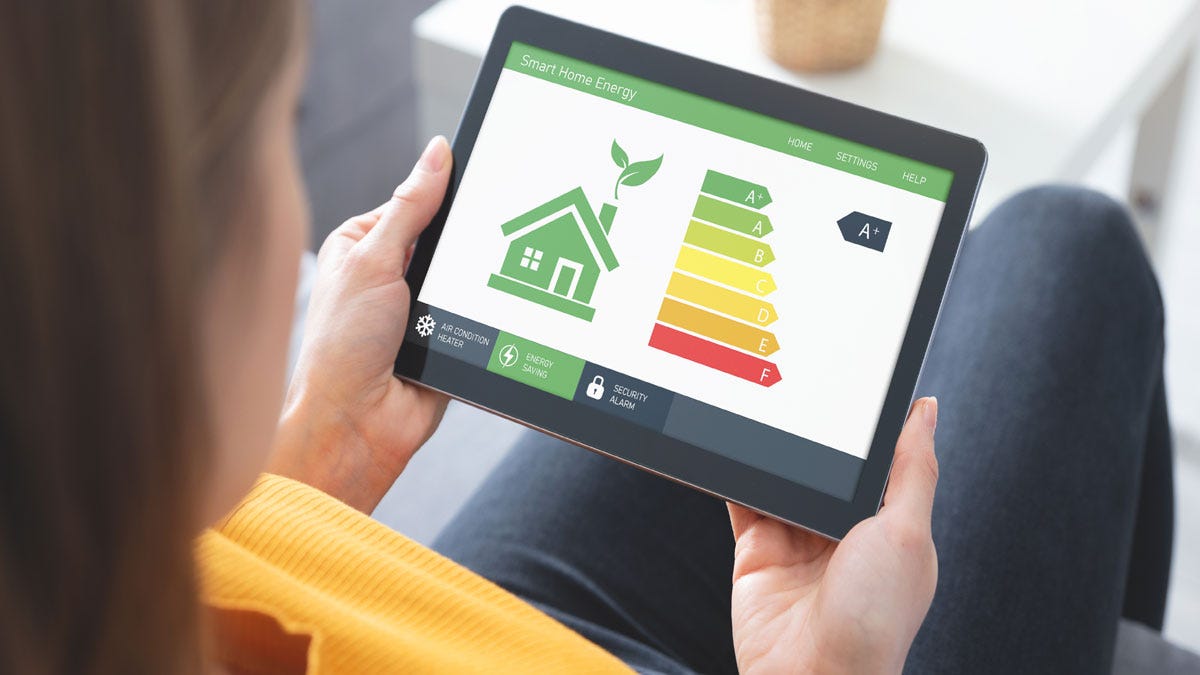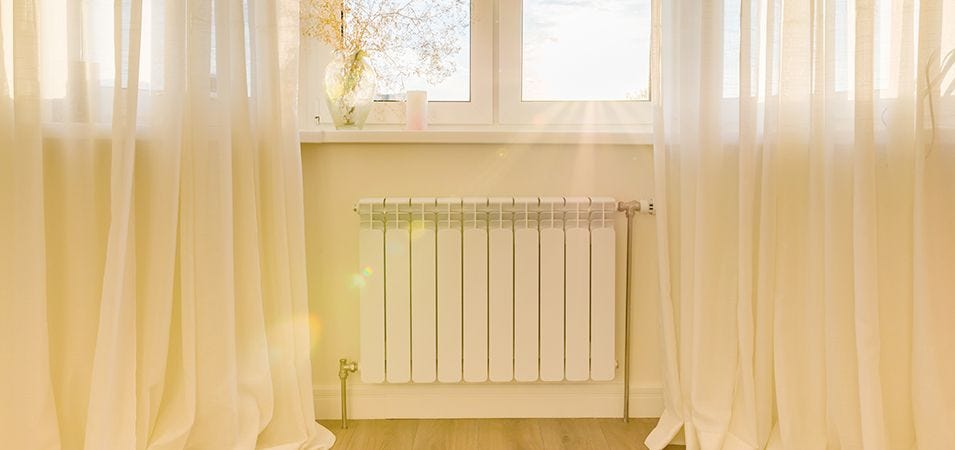How to save energy in your home


The cost of gas and electricity are at record highs at the moment, so it's really important to keep track of your energy usage to avoid eye-wateringly high bills. When it comes to energy efficiency, there are a number of steps you can take with regard to your heating that will save energy and reduce your heating bills to a more manageable level. In this article, we'll mention a few ways you can minimise your energy usage.
Delay putting on your heating
The later in the year you switch on your heating system, the less energy you'll use to heat up your home. Of course, if the outside temperature absolutely plummets then you should not risk your health by stubbornly refusing to turn on your heating.
However, there are those times when it feels a bit chilly and in the past, you would have immediately decided it was worth putting your heating on. This quite often happens in September and October when the heat of the summer has long gone and you start to notice it's not quite as comfortable without the heating on as it once was a few weeks earlier.
With such high electricity and gas prices, instead of putting on your heating, put on an extra pair of socks, a jumper or even invest in some thermal underwear. If you feel that you can cope with the temperature simply by putting on some extra layers, then do so. This will make a difference to saving energy and lowering your bills.
Turn down your thermostat
It's likely you've heard the energy efficiency advice to 'turn your thermostat down by 1°C' but what exactly does that mean? If your thermostat is at 22°C and you turn it down to 21°C, you will of course save some money but turning it down even further would save you even more.
If you go by the World Health Organisation's recommendation, you can actually turn your thermostat down to 18°C if you are healthy and appropriately dressed. (If you're elderly and/or with health conditions, the WHO recommends this goes up to 20°C). Not only will you be reducing your energy usage and saving some money, 18°C is actually the recommended bedroom temperature at night, so you may benefit from improved sleep.
Going below 18°C is not recommended, though you should st your temperature to a level that you feel comfortable with, in terms of health and finances.
Lower your boiler flow temperature
Boiler flow refers to the temperature of the water as it leaves your boiler to go to your hot water outlets and your heating system. Previous advice had recommended the boiler flow temperature to be between 65 - 75°C, but this is now generally accepted as being too high and is not necessary for maintaining a comfortable way of living.
If you have a combination (combi) boiler, you can turn the flow temperature for your heating down to 55°C and down to 50°C for your hot water.
If you can a standard boiler and hot water tank/cylinder,you can set your boiler temp to 63°C and your cylinder to 60°C.
Making these adjustments will not affect your comfort levels but will be using less energy, while still ensuring the water temperature is high enough to stop legionella bacteria from multiplying.
Use or install Thermotatic Radiator Valves
TRVs are a great way of micromanaging your heating system and will improve your energy efficiency if used properly.
The numbers on the valve relate to the temperature of the room, not the radiator. When the valve detects that the room temp has fallen below a certain temperature, it will open and allow hot water into the radiator t raise the temperature. Once the desired temperature has been reached, the valve will close to stop hot water unnecessarily continuing to flow into the rad. This means energy is only used when absolutely necessary.
It also means that you shouldn't trn your TRVs up the 5 (or whatever the maximum setting is) as this will cause the valve to constantly try and heat the radiator up to a very high temperature, never shutting and letting hot water continue to flow into the radiator. This would defeat the purpose of having TRVs instaled, so it's best to set them to between 2 and 3 and then leave them. In rooms that are rarely used, you could turn them down to one and only turn them up a bit when you know the room will be used.
For a complete explanation on how thermostatic valves work, please watch the video below.
Install insulation
Insulation is a great way to improve the amount of energy needed to heat your home, and you will find insulation in the loft, walls, floors and windows. Make sure your loft is well-insulated as this is the easiest place to save money. Heat rises so pack your loft with insulation and wreak the rewards; a home which is not adequately insulated loses a quarter of its heat through the roof.
Exterior walls are another area where a home can lose heat. If your home was built after the 1920s the chances are that external walls are made up of two layers with a gap or cavity between them, cavity wall insulation fills this gap; keeping the warmth in the house. Make sure your home has cavity wall insulation, or something similar.
All properties lose heat through their windows, but the newer the windows the more likely they are going to be better insulators. If your windows are double glazing then they are likely to be good insulators, however if you want to further insulate your home then you may consider energy-efficient glazing that will keep your home warmer, quieter and reduce energy bills.
Annual heating maintenance
A very simple way of improving the energy efficiency in your home and saving the amount of energy you use is by having a heating engineer on the Gas Safe Register come and perform maintenance on your boiler and heating system every 12 months.
Boilers are used such a lot of the time that it's inevitable that components wear out or at least need inspecting. Having a heating engineer take a look at your system will help keep your boiler running efficiently and will take care of any issues before it becomes an emergency. A boiler breaking down during the middle of winter is not only an incredible inconvenience, but can also be very expensive to fix. Plumbers and heating engineers are dealing with a lot of urgent heating issues at that time of year so you may have to pay a higher premium or face waiting for one to become available.
Having you boiler regularly maintained should help avaoid this issue and will ensure you are not using unnecessary energy.
Energy-efficient lighting
Changing your light bulbs is one of the least expensive methods of saving energy in your home. Research has shown that £1 out of every £3 spent on lighting and heating your home is wasted. So switching to energy saving light bulbs should be first on the agenda. Although energy saving light bulbs cost more than a traditional bulb, energy saving light bulbs will save you money on your energy bills over the course of their lifetime.
Not only does energy saving bulbs save you money on your energy bills but they last much longer than the traditional bulbs. You may be thinking what’s the catch? There really is only one minor catch and that is that the energy efficient bulbs take longer to turn on (only a few seconds) and some cannot be used with dimmer switches.
Water usage
By saving water in your home you are helping to reduce the likelihood of hosepipe bans and will save yourself money. Using water, especially hot water, uses energy and increases emissions of greenhouse gases which contributes to climate change.
During a drought it’s even more important to make sure water is not wasted. The average bathroom accounts for around 60% of the water we use in our everyday lives. Saving this water can help both the environment and your pocket. Simple things such as turning the tap off when brushing your teeth can make a huge difference and save up to 6 litres of water a minute.
When in the shower, use an optimised shower head which uses technology to enable you to use the water you need without compromise. In addition, if you shower for a minuet less than usual then you could save yourself a small fortune in the long term. About a third of all the clean and drinkable water we use in your homes is flushed down the toilet; however, there is a very easy way to address this.
You can save lots of water by using something called a cistern displacement device, or in other words something you put in your cistern to take up some of the space that fills with water when you flush. You will probably only need one of these if your toilet was fitted before 2001, as cisterns fitted later were smaller and more efficient. If your toilet has a duel flush system then you don’t need to worry.
Energy-efficient radiators at TradeRadiators.com
Save money - and the environment - with our energy-saving range of radiators which gets you more for less. The range of energy-efficient radiators here at Trade Radiators offers homes practical and cost-effective heating.
An energy-efficient radiator is best suited to the rooms where you use your heating the most, as that’s where you save the most. So whether that’s your living room, bedroom, or dining room, an energy-efficient radiator will help you save without having to compromise on your home’s heat.


